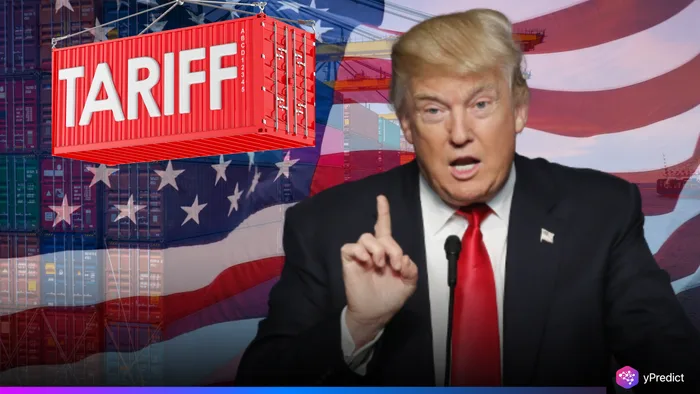
Donald Trump’s recently proposed baseline tariff of 50% on all Chinese imports has created a ripple effect in global markets. While he is not currently in office, he is undoubtedly a serious entity. His economic rhetoric is already beginning to move market expectations forward to 2025, given the possibility of a Trump term that overlaps with global tensions. For stock market investors, the proposal isn’t campaign noise; it represents a major transformation that resonates down the supply chain to collide with global trade flows, impact corporate earnings, and sentiment for risk in the market.
An impact in India is difficult to ignore. The Nifty 50 index has been riding high with domestic demand and corporate earnings. However, the downside risk of all this new incremental global trade tension may prompt volatility that wipes out recent gains. Those who are bullish on Nifty will have to reinven their playbook if we do end up in a tariff war while Wall Street will have to plan for political blow-up shocks that unfold.
It’s a Real Threat to Market Stability
Trump’s 50% tariff proposal aims to sharply reduce US dependence on Chinese imports. While some see it as an election bluster, investors can’t afford to ignore the risk. A sweeping tariff like this would likely spark retaliatory measures from China, creating fresh waves of global trade tensions.
Global stocks depend heavily on trade predictability. Disruptions in supply chains, rising input costs, and shrinking export volumes are real dangers. Sectors like electronics, autos, and chemicals could see sharp corrections. If Trump’s policy gains traction, stock market investors will face a climate of fear and uncertainty that could drag indices lower across regions.
How Indian Stocks, Especially Nifty, Could Get Caught in the Crossfire
While the Indian economy is not as exposed to China as others, it still operates in a deeply interconnected world. A global selloff triggered by US-China tensions will not spare Indian equities. FPIs (foreign portfolio investors), who have poured money into Indian markets this year, might pull out capital to manage risks elsewhere.
This kind of capital outflow puts pressure on the rupee, raises inflation fears, and often leads to rate concerns. All these directly affect sentiment. Nifty bulls who have ridden the wave of earnings momentum and sectoral rotation will face resistance. Stock market investors who bet on tech, pharma, or manufacturing might need to hedge their portfolios if these global tremors get stronger.
Global Trade Tensions Could Force Central Banks Into Defensive Mode
Trade wars don’t just hurt companies, they complicate central bank strategies. If tariffs push up input prices, inflation risks rise. That limits monetary flexibility. The US Fed and other central banks might hesitate to cut rates.
This directly affects equity valuations and liquidity flows. In India, the RBI may have to hold rates or slow down easing plans. Higher borrowing costs hurt business expansion, and this will eventually show up in earnings reports. Stock market investors tracking macro cues will likely turn cautious if central banks tighten their stance due to tariff-induced inflation.
What Should Nifty Bulls and Long-Term Investors Do Now?
Although near term pain appears inevitable, not all is gloom. Investors need to continue to track global trade discussions, pay attention to signals on the direction of Fed policy, and stick to diversification. Staying invested in companies that have a solid domestic demand, some pricing power, and low dependency on imports can provide some insulation.
If you are a Nifty bull, this is a time for prudent positioning, not panic. Look at sectors such as FMCG, banking and capital goods, which are less reliant on global flows. Long term stock market investors should not overreact, they should just be patient and try to identify value during a pullback.







